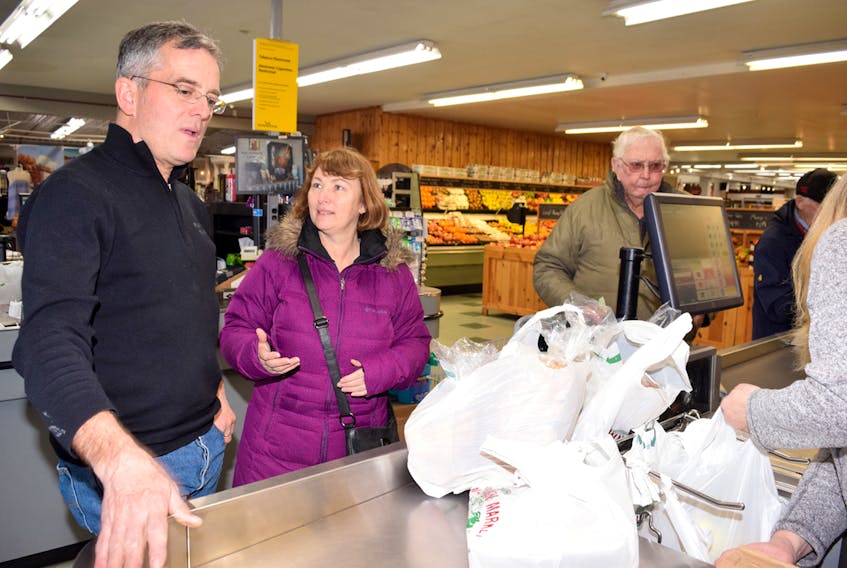MASSTOWN, N.S. – Educating consumers on how best to dispose of single-use plastic products would be a more favourable approach than banning grocery bags, according to one retailer.
“As a consumer, or an individual, I don’t necessarily like the idea of someone telling me what I can and can’t do,” said Laurie Jennings, owner of Masstown Market.
“We really need to educate folks to understand the whole picture before we make any rash decisions,” said Jennings, who estimates his operation goes through close to two million bags per year.
“Anybody who thinks that banning grocery bags is going to solve the problem, is misinformed.”
Environment Minister Iain Rankin recently said he’s considering a province-wide ban or a special levy on plastic bags as a way to limit the growing stockpile of film plastic in the province, since China imposed its own ban on importing the waste products.
Jennings said his understanding is that plastic grocery bags only account for five per cent or less of single-use film plastic products. And to impose a ban on that single item would only serve to deceive consumers into believing the issue was being dealt with.
“It’s pallet wrap and it’s packaging and it’s a whole lot more than just grocery bags,” he said, of the overall plastic waste problem. “And so the notion of banning grocery bags, I think right now the consumer thinks that will solve the problem but that’s just a tiny piece of it.”
Jennings also pointed to the white plastic coverings used for hay bales and for other agricultural purposes.
“So the notion that banning plastic bags is going to solve this problem is not a fact,” he said. “And if we’re doing something just to be symbolic, I’m not sure that is a good thing to do.”
Representatives for the seven municipal units that make up the Northern Region recently met in Debert to discuss the plastic bag issue. The consensus from that session is that each rep from the municipalities of Colchester, Cumberland, East Hants, Truro, Stewiacke Amherst and Oxford, will recommend to their respective councils for support for a province-wide ban, said regional chairman Tom Taggart.
“We would support a ban on one-time use shopping bags, providing it is province wide,” he said.
If a consensus is reached from the Northern Region group, Taggart said, a resolution would then be put forth to the province stating that position.
While such a consensus would not have to be unanimous, it would require majority support from the seven councils.
Jim Cormier, director for the Atlantic chapter of the Retail Council said his members would also support a ban under certain parameters.
“We’ve been working closely with the province on this since the China government made its announcement,” Cormier said. “We understand that it’s an issue obviously for governments but on the other hand we’re trying to balance that with the fact that retail is one of the most competitive industries in the economy and customers are fickle. They want what they want.”
Cormier said the retail council could support either a bag levy or a ban on the single-use plastic bags, provided it is mandated by the government as a province-wide initiative.
What the council would be opposed to, he said, would be for the provincial government to leave it up to the municipal units to determine their strategy individually.
That method has been proven to be less than successful in Quebec and B.C., where municipalities were permitted to do their own thing, Cormier said.
“Then you end up with a situation that’s not harmonized,” he said. This, in turn, can lead to harsh competition between stores in neighbouring communities were plastic bags are banned or levies are applied in some areas but not in others.
“What is does is create confusion and frustration for consumers,” Cormier said.
“It’s not our preferred option but we could work with a bag ban. But if you are going to do it, do it in a harmonized process across the province. That way there’s a level playing field, it’s administratively harmonized.”









